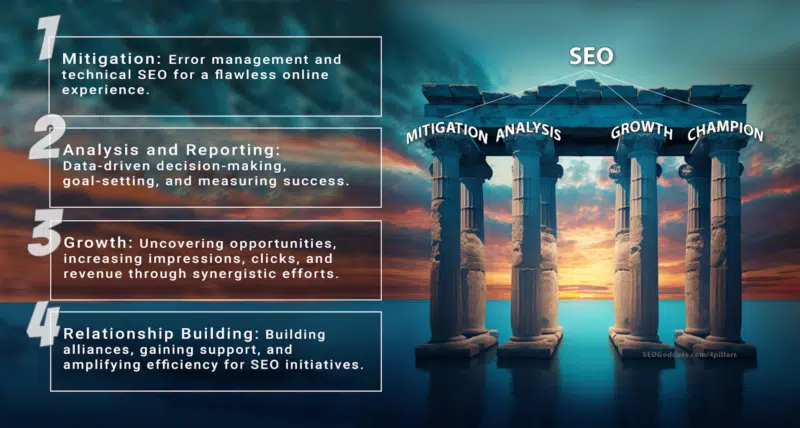In 2017, I crafted a comprehensive four-part system to structure SEO strategies and teams, which was covered in various publications and was reviewed on the “Best SEO Podcast” by Matt Bertram and Chris Burres.
Drawing from my leadership experience with companies like Nordstrom, Groupon and GitHub, and my work with diverse consulting clients, I have refined this approach of emphasizing effective communication, collaborative teamwork, and harmonious synergy as the four pillars of success in enterprise SEO.

By employing this refined four-pillar approach, teams can navigate the corporate landscape with expertise, forging a path to continued success in the ever-evolving world of SEO.
Pillar 1: Mitigation – Channeling the power of technical SEO
This pillar focuses on error management and technical SEO. As an SEO manager, a significant portion of the team’s time is spent identifying issues after launching a project.
From the beginning, the technical SEO team can save time, effort and money by working closely with engineering teams, project managers, and product managers.
Education is vital, ensuring everyone understands SEO nuances and can make informed decisions.
Imagine embarking on an epic quest through the digital landscape, where technical SEO reigns supreme.
Equipped with our SEO superpowers, we bravely crawl through websites, identifying hidden issues that demand immediate attention.
The technical SEO team forms alliances with engineering teams, empowering them with SEO knowledge to make intelligent decisions that eliminate the need for future fixes.
From conquering accessibility challenges to optimizing page speed, they confront server codes and errors, engaging in front-end and back-end engineering.
They aim to ensure a flawless online experience from search to results.

Pillar 2: Analysis and reporting – Unmasking SEO insights
Within this foundational pillar, the SEO team engages in calculating assumptions and presenting reports on achievements.
Recognizing the influence of SEO on vital performance indicators such as traffic and revenue is paramount for any company.
However, reporting can prove intricate due to the requirement of tracking keywords from Google organic search.
To address this, having a dedicated SEO expert or team handling reporting fulfills the necessity of gathering data from Google Search Console and other analytics reporting tools, facilitating the creation of a holistic overview.
By precisely measuring and reporting SEO performance, the entire SEO team and relevant stakeholders can discern successful strategies, areas that warrant enhancement, and novel prospects.
In SEO, analysis becomes our trusty sidekick, guiding our every move with unwavering precision.
Equipped with the transformative powers of data, the SEO reporting team embarks on a profound expedition into its enigmatic realms.
Their odyssey begins within the realms of Google Keyword Planner or other similar keyword analysis tools, where they unveil the latent growth potential by intertwining it with click-through and conversion rates.
Through this amalgamation, they can discern and predict the impact of our SEO endeavors with remarkable precision.
Regular reports become their secret weapon, allowing stakeholders to compare estimations with actual results and reveal their success.
The SEO team can set clear goals for every fiscal year, quarter, and month, ensuring their path is paved with measurable success.
Equipped with analysis and reporting power, the SEO team fears no uncertainty in their heroic quest for SEO glory.
Get the daily newsletter search marketers rely on.
Pillar 3: Growth – Igniting the flames of SEO triumph
This pillar involves determining growth and managing projects for SEO.
While addressing and reporting on existing SEO work is essential, the team must also identify upward search trends and fill any gaps in their current efforts.
A project manager (or product manager) in SEO plays a vital role here, overseeing initiatives that impact significant portions of the website.
This can involve overhauling design and content on specific pages or driving an internal linking plan affecting various site aspects. An effective SEO product manager will lead to substantial revenue growth from SEO.
This is where the SEO super-team unleashes its true might.
Through meticulous analysis, they discover hidden opportunities that serve as stepping stones to victory.
The team will embark on daring projects, wielding power to increase impressions, clicks (traffic), and the ultimate treasure: revenue.
Their journey takes them to keywords hungering for content improvement and new keywords yearning for attention.
The SEO product manager synergizes with other teams to conquer the ever-evolving SEO landscape.
Even in technical SEO, they seize positions, click-through rates, and revenue with unrivaled skills.
With growth as their guiding star, the SEO team will emerge as the mighty heroes of the digital realm.
Pillar 4: Championing – Building strong relationships through communication for SEO
The final pillar revolves around championing SEO to stakeholders and other teams.
Building relationships across the organization is crucial to SEO success. Once initiated with the first three pillars and the team works well, the SEO team can focus on relationship-building.
This can be done by the SEO team’s manager or director or by instilling this mindset in each SEO team member.
The goal is to engage with engineering, creative, legal, and public relations teams and other areas to gain support and buy-in for SEO initiatives, leading to overall SEO and company growth.
The pinnacle of triumph, where relationships are forged and bonds are unbreakable. The SEO dream team rises above the rest by building alliances with other teams.
The team communicates openly, extending their unwavering support, for they understand that unity is the key to victory.
The SEO lead (manager or director) cultivates connections with stakeholders, leadership, and engineering, laying the foundation for a harmonious existence.
These relationships garner support for SEO initiatives and amplify the team’s efficiency.
Liberated from the chains of constant persuasion, they devote more time to collaboration, working hand in hand with others.
Together, they form an unstoppable force, an SEO dream team like no other!
Overall, the industry has seen a shift in how corporate structures visualize SEO.
Some companies are moving toward subject matter expert (SME) or individual contributor (IC) roles within engineering, content/creative, reporting, and marketing teams. They then come together periodically to communicate updates for SEO.
This new structure allows for better revenue reporting, project prioritization, and effective communication up the chain.
The changes in corporate structure and visualization for SEO benefit both the companies and the industry as a whole.
Adopting these four pillars of enterprise SEO into your SEO strategy and adapting them to your organization’s needs can create a solid approach and build a successful team.
Embracing the four pillars of SEO success
Organizations should embrace the four pillars as the map to SEO success.
Through the power of mitigation, analysis, growth, and relationship building, enterprise SEO teams will conquer new frontiers and ascend to unprecedented heights.
Just as superheroes unite to save the day, so shall your team unite to triumph in SEO.

Opinions expressed in this article are those of the guest author and not necessarily Search Engine Land. Staff authors are listed here.
